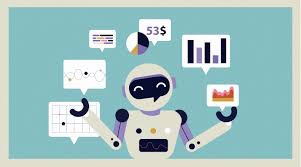Source – livemint.com
New Delhi: Changing customer expectations, falling customer satisfaction, and the promise of lower operating costs are among the major reasons why companies are increasingly adopting artificial intelligence (AI)-powered chatbots for use as virtual agents or assistants.
The banking, financial services and insurance (BFSI) sector is clearly taking the lead in India. Consider the case of HDFC Bank Ltd, which said this September that its Facebook Messenger chatbot OnChat had registered a 160% month-on-month growth in transactions. HDFC Bank also has an AI chatbot called ‘Eva’, built for it by Bengaluru-based Senseforth AI Research, which has “successfully addressed over 2.7 million customer queries in the six months since its inception”.
OnChat, which received over 2.4 million messages, “witnessed nearly 25% usage by non-HDFC Bank users as well, who used the bot to transact and use services”, Nitin Chugh, country head-digital banking, HDFC Bank, said. The chatbot was launched in collaboration with an AI start-up, Niki.ai, on Facebook Messenger platform in December 2016.
HDFC Bank is not alone. Forrester Data reveals 57% of firms globally are already using chatbots or plan to begin doing so in 2017.
Artificial intelligence banking platform Payjo, for instance, announced this September that it had launched an AI-powered chat assistant for the State Bank of India (SBI) to address customer enquiries. The chat assistant—called SBI Intelligent Assistant, or SIA—according to a press statement, can handle nearly 10,000 enquiries per second, or 864 million in a day.

The bot is expected to handle key work processes—answer customer queries which revolve around home, education, car and personal loans, and recurring and term deposits.
Last April, DBS Bank Ltd launched a banking app in India with in-built AI. ICICI Bank Ltd, on its part, installed ‘Software Robotics’ in 2016. It imitates human actions and is used in over 200 business processes across its various operations. Yes Bank Ltd’s AI-powered bots are expected to reach about 0.25 million customers by fiscal 2018, the bank said this July.
Chatbots are being used in other sectors too. According to a 9 May study by Juniper Research Ltd, chatbots will redefine the customer service industry, with healthcare and banking sectors set to benefit the most. Juniper forecasts that the success rate of bot interactions in the healthcare sector (those completed without relocation to a human operator) will move from 12% currently, to over 75% in 2022. In the banking sector, Juniper expects this to reach over 90% in 2022.
This March, for instance, iPredictt Data Science Labs Pvt. Ltd—a data analytics company—said it had introduced the chatbot functionality based on AI to their recruitment intelligence platform, Careerletics. The AI chatbot automatically identifies the scope of missing data in the profiles of candidates who have uploaded their resumes on Careerletics and reaches out to those candidates to fill in the missing information via chat links.
AI chatbots are getting a voice of their own too. On 27 September, for instance, Chennai-headquartered software product company Zoho Corp. Pvt. Ltd launched Cliq, a chat software that “blends instant messaging with video, audio, and group conferencing”. Cliq integrates with Zoho and third-party applications.
In April, Tata Capital Ltd—the financial services arm of the Tata Group—unveiled its AI-based online chatbot to handle “over 70% of the routine customer queries” including product information, application tracking and sales and after-sales service. Currently, the chatbot services Tata Capital’s retail products including personal, home, car, business and two-wheeler loans.
Chatbots, according to a 24 May note by research firm Forrester, can also improve efficiency in completing simple tasks like pushing coupons and redeeming loyalty points, and also build emotional connections between customers and brands and increase engagement.
However, Forrester analysts point out that chatbots can also fail due to common mistakes like not clearly defining their purpose; setting goals that are too ambitious for existing tech capabilities; and launching them before they are ready.
According to Yashraj Erande, partner and director, The Boston Consulting Group (BCG), there are two broad categories of enterprise chatbots–one that talk to employees, and the other that talk to consumers.
The first chatbot is primarily aimed at internal communication (chat/SMS/email) among the management, employees, vendors and partners. So far, such chatbots typically cater to “non-mission critical” tasks. “They can help banks and financial institutions cut costs but they do not necessarily provide a better consumer experience”, believes Erande.
Chatbots that can add true value to business, according to Erande, are those that are “capable of almost real-time chat and emailing and not those that simply cater to standard mundane communication”. Besides, he adds that AI-enabled enterprise chatbots find it difficult to scale up especially when you compare them to Apple Inc.’s Siri, Amazon Inc.’s Alexa, Google Inc.’s Allo and Duo, or Samung Electronics Co.’s Bixby due to relatively limited learning data sets.
To be really effective, AI chatbots need to deal with things like real-time workforce management and delivering a personalised customer experience, according to Erande. He cited the examples of DBS and Santander innovating on using AI-enabled chatbots.
As for security, Erande believes that as long as the chatbots are used in a pre-defined workflow and not transacting with unregulated external application programming interfaces (APIs), they “won’t pose a (security or privacy) risk”.
To truly meet the need for enterprise-grade customer service, Forrester analysts explained in a 29 June note, chatbots (also called virtual agents and cognitive agents) must be able to understand what a customer speaks or types, discern their intent, respond in a conversational manner, and act on the customer’s behalf. All of this must take place in a secure environment, and the chatbot must seamlessly hand off the interaction to a live agent when required.
Else, chatbots will simply prove to be clever marketing gimmicks rather than adding value to businesses.
